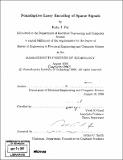Nonadaptive lossy encoding of sparse signals
Author(s)
Pai, Ruby J
DownloadFull printable version (12.26Mb)
Other Contributors
Massachusetts Institute of Technology. Dept. of Electrical Engineering and Computer Science.
Advisor
Vivek K. Goyal.
Terms of use
Metadata
Show full item recordAbstract
At high rate, a sparse signal is optimally encoded through an adaptive strategy that finds and encodes the signal's representation in the sparsity-inducing basis. This thesis examines how much the distortion rate (D(R)) performance of a nonadaptive encoder, one that is not allowed to explicitly specify the sparsity pattern, can approach that of an adaptive encoder. Two methods are studied: first, optimizing the number of nonadaptive measurements that must be encoded and second, using a binned quantization strategy. Both methods are applicable to a setting in which the decoder knows the sparsity basis and the sparsity level. Through small problem size simulations, it is shown that a considerable performance gain can be achieved and that the number of measurements controls a tradeoff between decoding complexity and achievable D(R).
Description
Thesis (M. Eng.)--Massachusetts Institute of Technology, Dept. of Electrical Engineering and Computer Science, 2006. Includes bibliographical references (p. 67-68).
Date issued
2006Department
Massachusetts Institute of Technology. Department of Electrical Engineering and Computer SciencePublisher
Massachusetts Institute of Technology
Keywords
Electrical Engineering and Computer Science.